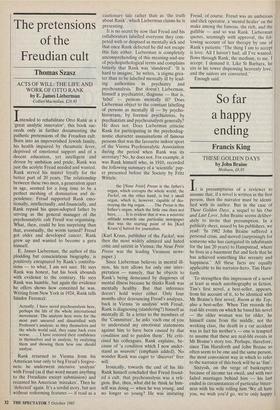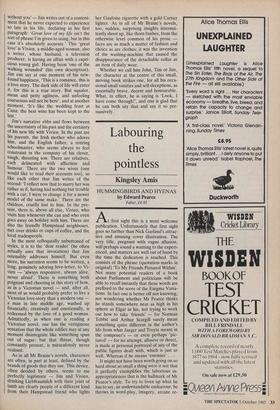So far a happy ending
Francis King
THESE GOLDEN DAYS by John Braine
Methuen, f8.95
It is presumptuous of a reviewer to assume that, if a novel is written in the first person, then the narrator must be identi- fied with its author. But in the case of These Golden Days, a sequel to his One and Last Love, John Braine seems deliber- ately to invite that presumption. In a publicity sheet, issued by his publishers, we read: 'In 1982 John Braine suffered a personal crisis, and moved (surprisingly for someone who has castigated its inhabitants for the last 20 years) to Hampstead, where he lives in a basement flat and feels that he has achieved something like serenity and happiness.' All these facts are equally applicable to his narrator-hero, Tim Ham- forth.
To strengthen this impression of a novel at least as much autobiography as fiction, Tim's first novel, a best-seller, appears, from his account of it, to be identical with Mr Braine's first novel, Room at the Top, also a best-seller. When Tim records the real-life events on which he based his novel — the older woman was far older, he himself came from the middle, not the working class, the death in a car accident was in fact his mother's — one is tempted to assume that these are real-life events in Mr Braine's story too. Perhaps, therefore, since Tim Harnforth and John Braine so often seem to be one and the same person, the most convenient way in which to refer to the narrator of this book will be as 'Jim'.
Sixtyish, on the verge of bankruptcy because of income tax owed, and with two failed marriages behind him — his last ended in circumstances of particular bitter- ness with his wife telling him 'We all hate you, we wish you'd go, we're only happy without you' — Jim writes out of a content- ment that he never expected to experience so late in his life, declaring in his first paragraph: 'Great love of my life isn't the sort of phrase I'm given to using, but in this case it's absolutely accurate.' This 'great love' is Vivien, a middle-aged woman, also a writer, who husband, a television producer, is having an affair with a capri- cious young girl. Having been 'one of the walking wounded' (his own description), Jim can say at one moment of his new- found happiness, 'This is a romance, this is a love story. The dark side of life will enter it, for this is a true story, But squalor, mean and petty ugliness, and unfeeling coarseness will not be here', and at another moment, 'It's like the wedding feast at Cana: the best wine has been kept to the last.'
Jim's narrative ebbs and flows between the uncertainty of his past and the certainty of his new life with Vivien. In the past are his parents, the Irish mother who adores him, and the English father, a retiring schoolmaster, who seems always to feel constraint in the company of his clever, tough, thrusting son. There are relatives, each delineated with affection and humour. There are the two wives (one would like to read their accounts too), so like each other that Jim writes of the second: 'I reflect now that to marry her was rather as if, having had nothing but trouble with a car, I were to change it for a newer model of the same make.' There are the children, cruelly lost to him. In the pre- sent, there is, above all else, Vivien, who visits him whenever she can and who even goes away on holiday with him. There are also the friendly Hampstead neighbours, met over drinks or cups of coffee, and the local tradespeople.
In the most colloquially unbuttoned of styles, it is to the 'dear reader' (he often actually uses that invocation) that Jim ostensibly addresses himself. But even more, his narration seems to be written, a long, genuinely adoring love-letter, to Vi- vien — 'always responsive, always alive, never afraid'. There is something both poignant and cheering in this story of how, as in a Victorian novel — and, after all, most of us would probably prefer to live a Victorian love-story than a modern one a man in late middle age, washed up financially, creatively and emotionally, is redeemed by the love of a good woman. Admittedly, as when one is reading a Victorian novel, one has the vertiginous sensation that the whole edifice may at any moment disintegrate like something spun out of sugar; but that threat, though constantly present, is miraculously never realised.
As in all Mr Braine's novels, characters are often, in part at least, defined by the brands of goods that they use. This device, often derided by others, seems to me perfectly legitimate — Jim and Vivien, drinking Liebfraumilch with their joint of lamb are clearly people of a different kind from their Hampstead friend who lights her Gauloise cigarette with a gold Cartier lighter. As in all of Mr Braine's novels, too, sudden, surprising insights intermit- tently shoot up, like thorn bushes, from the otherwise level common of his prose faces are as much a matter of fashion and choice as are clothes; it was the invention of the washing-machine that caused the disappearance of the detachable collar as an item of daily wear.
Whether we call him John, Tim or Jim, the character at the centre of this small, moving book strikes one, for all his occa- sional small vanities and self-deceptions, as essentially brave, decent and honourable. What, in effect, he is saying is 'Look, I have come through!', and one is glad that he can both say that and say it so per- suasively.



























































 Previous page
Previous page